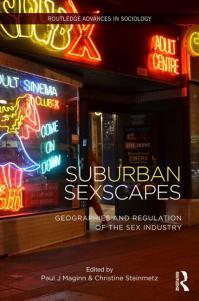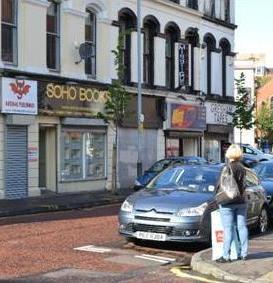Dr. Paul Maginn is an Associate Professor of Urban Planning at the University of Western Australia; he is the co-editor and co-author of several chapters in the recently published book (Sub)Urban Sexscapes: Geographies and Regulation of the Sex Industry. I asked him to comment on his book and explain why a planner & geographer is so interested in sex work.
 At social events whenever we meet someone new for the first time it can be guaranteed that they will ask, “So, what do you do for a living?” In the past, my stock response was generally: “I’m an academic…an urban planner”! The stock replies to this usually range from: “Oh! What does that mean?” to “Oh, that’s nice! I have to go now because there’s my friend over there”. You see, being an academic doesn’t seem to capture too many non-academic peoples’ attention. So nowadays, when I’m asked what I do for a living I say: “I’ll give you three guesses”. I do this because it’s a good way to sustain conversation, it can be fun, and it’s a way of testing people’s perception of oneself.
At social events whenever we meet someone new for the first time it can be guaranteed that they will ask, “So, what do you do for a living?” In the past, my stock response was generally: “I’m an academic…an urban planner”! The stock replies to this usually range from: “Oh! What does that mean?” to “Oh, that’s nice! I have to go now because there’s my friend over there”. You see, being an academic doesn’t seem to capture too many non-academic peoples’ attention. So nowadays, when I’m asked what I do for a living I say: “I’ll give you three guesses”. I do this because it’s a good way to sustain conversation, it can be fun, and it’s a way of testing people’s perception of oneself.
Invariably, posing this question to people seems to immediately get their imaginations racing; it’s something of a “loaded” question, after all. Hence, people start to think that you do something weird, exciting, dangerous or risqué for a living. Whilst I was in my hometown of Belfast, Northern Ireland, in July 2013 I had the pleasure of meeting up with activist Laura Lee, who was on tour at the time. We were sitting outside a well-known bar having a drink when a woman and her adult nephew, out celebrating the latter’s birthday, asked if they could sit at our table. Of course, being sociable creatures we said, “Sure, no problems! But you may want to avert your ears because of our conversation”. They laughed and insisted that they were big enough not to be offended by whatever we were discussing.
 Sure enough, this being Belfast, the nephew turned to us shortly after sitting down and said: “So what do yous’ do for a living?” Laura and I looked at one another, smirked and replied: “We’ll give you three guesses!” Then without skipping a beat Laura replied in her Dublin burr: “I’m a professional dominatrix!” The nephew was dumbfounded, even more so when Laura presented him with her business card. He excitedly asked if he could keep the card, adding quickly, “Not that I want to book you or anything”. Then he looked me up and down and asked, “Are you in porn?” Laura Lee can testify on a Sisters of Mercy bible that this actually happened! I replied: “Close, but no cigar. I’m not in porn. But, I’m into porn!” I qualified this by explaining that I was an academic planner who researched the geographies and regulation of the sex industry and was working on a book on the subject.
Sure enough, this being Belfast, the nephew turned to us shortly after sitting down and said: “So what do yous’ do for a living?” Laura and I looked at one another, smirked and replied: “We’ll give you three guesses!” Then without skipping a beat Laura replied in her Dublin burr: “I’m a professional dominatrix!” The nephew was dumbfounded, even more so when Laura presented him with her business card. He excitedly asked if he could keep the card, adding quickly, “Not that I want to book you or anything”. Then he looked me up and down and asked, “Are you in porn?” Laura Lee can testify on a Sisters of Mercy bible that this actually happened! I replied: “Close, but no cigar. I’m not in porn. But, I’m into porn!” I qualified this by explaining that I was an academic planner who researched the geographies and regulation of the sex industry and was working on a book on the subject.
So, what do planners and planning have to do with the sex industry? When commercial forms of sex – street- or brothel-based sex work; adult entertainment (e.g. stripping, lap-dancing or pornography); BDSM services; and sex shops, novelty stores or erotic boutiques – manifest they require spaces or premises to operate from. This is where planning and zoning come into play. Put simply, planning is concerned with trying to create “orderly” spaces by ensuring that there is a place for everything, and that everything is in its place via zoning. Planners basically use rationality and technical skills to ascertain whether or not certain land-uses should permitted; however, when commercial sex premises are presented for planning/zoning approval they are often hijacked and held for political and moral ransom by politicians and others who often vehemently object to such proposals, even when such land-uses are perfectly legal.
It is this politicisation of planning and the wider politics and political rhetoric that tend to surround commercial sex industry activities that particularly interest me as an academic. I’ve done some work looking at how state politicians in Western Australia (WA) have framed sex work in the wake of proposals to introduce legislation to regulate street- and brothel-based sex work. In short, the political debates here in WA (and elsewhere in Australia for that matter) tend to be informed and dominated by moral arguments as opposed to evidence. The same also applies to Northern Ireland, which recently passed the Human Trafficking and Exploitation Bill. This Bill, when it finally receives Royal Assent, will see the introduction of the so-called Swedish Model of regulation of sex work.
 There has been a fervent (some might say unhealthy) over-interest by governments, certain religious organisations and some branches of the feminist movement, in the sex lives of citizens. Such over-interest has spurred the introduction (or efforts to introduce) legislation designed to exclude sex shops, curtail the number of strip clubs, prevent people from downloading “extreme porn” and criminalising the purchaser of sex services. I am not suggesting for one minute that there should be no regulation of the different sectors of the sex industry, and neither do the various sex workers I know. But recent efforts to regulate different forms of sex work are akin to using a sledgehammer to crack a nut. It also seems fairly clear from observing proceedings in Northern Ireland, the Republic of Ireland and Canada, for example, that politicians have little regard for the nuanced evidence on sex work and the “Swedish model”. I mean, who needs evidence when you have blind faith on your side?
There has been a fervent (some might say unhealthy) over-interest by governments, certain religious organisations and some branches of the feminist movement, in the sex lives of citizens. Such over-interest has spurred the introduction (or efforts to introduce) legislation designed to exclude sex shops, curtail the number of strip clubs, prevent people from downloading “extreme porn” and criminalising the purchaser of sex services. I am not suggesting for one minute that there should be no regulation of the different sectors of the sex industry, and neither do the various sex workers I know. But recent efforts to regulate different forms of sex work are akin to using a sledgehammer to crack a nut. It also seems fairly clear from observing proceedings in Northern Ireland, the Republic of Ireland and Canada, for example, that politicians have little regard for the nuanced evidence on sex work and the “Swedish model”. I mean, who needs evidence when you have blind faith on your side?
Moreover, they seem to have contempt for the real experts in the field – sex workers – and a fixation that sex work is populated only by “fallen women” in need of “rescue”. But sex work is a highly complex form of labor that takes places in a variety of spaces – streets, cars, bars, hotels, casinos, brothels, houses/apartments and the internet – and involves people who identify as female, male transgender and intersectional, who are straight, queer and bisexual, and who come from a range of nationalities and ethnic backgrounds. Whilst sex is obviously a key facet of the transactional relationship between sex workers and clients, there is much more to sex work than just sex.
If governments were sincere about reducing harm to sex workers, their efforts would be better placed on protecting the human and workplace rights of sex workers. As we know, banning, prohibiting or over-taxing particular goods and services (e.g. alcohol, tobacco, drugs, pornography and diesel) merely creates alternative unregulated markets which are often controlled by criminal elements; they thus represent a loss of tax revenue for governments and pose a higher risk to people (the very thing that governments claim they want to reduce). Government regulation of the sex industry needs to be measured, pragmatic and evidence-based; policies premised on stereotypes, religious beliefs and moral superiority do more harm than good and result in unintended consequences.
So, next time you’re at a party, a wedding, Bar Mitzvah or funeral and you happen to bump into an urban planner why not say to them: “Let’s talk about sex”? I’m sure you’ll make their day, but be sure to clarify what you mean if you want to avoid them thinking that you’re coming on to them. 
